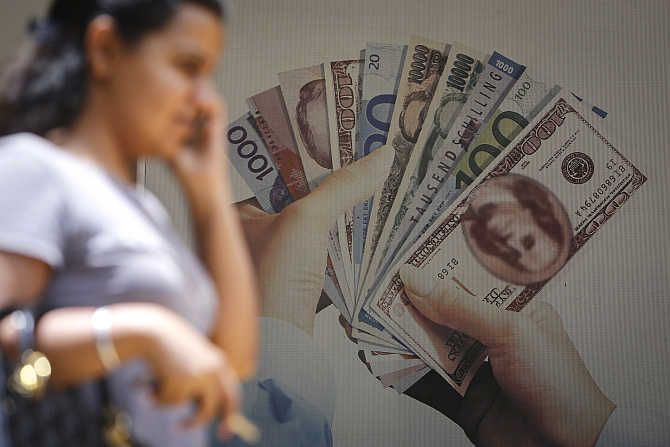'Is this the only way for India to become a $5 trillion economy?'
'When you have unused foreign exchange here, why borrow more dollars?'

The Narendra Damodardas Modi government's plan to go in for sovereign borrowings from the international market has drawn adverse reactions from economists and bankers.
For the first time, former RBI governor Raghuram Rajan and the Swadeshi Jaagran Manch are on the same side; both are of the opinion that there is risk involved in what the government is planning to do.
"This is a decision that is imprudent and dangerous," Dr Ashwani Mahajan, below, co-convenor, Swadeshi Jagran Manch, tells Rediff.com's Shobha Warrier.
In February 2018, then finance minister Arun Jaitley wrote, 'Most of the debt is of domestic origin insulating the debt portfolio from currency risk. The limited external debt provides safety from volatility in the international financial markets'.
What has changed after the new government and the new finance minister took charge?
I would say that was prudent advice by the then finance minister. It is a fact that international forces have been arguing for external sovereign debt, and this is nothing new. Previously also, those agencies made many efforts to convince various governments.
The idea of sovereign debt was discussed by various governments in the past, but it was never pursued.
It was discussed during P V Narasimha Rao's time, Atalji's time, Manmohan Singh's time and even during Modi 1, but it was rejected all the time. But now, it has been accepted.
The sad part of the whole story is that this was put in the Budget speech without discussing with the stakeholders.
Stakeholders, means?
Economists, experts, previous RBI governors, bankers, etc as they have the exposure to these kinds of ideas.
It is quite evident that the bureaucratic circle around the finance minister has been pushing it hard.
The fact is this was included in the Budget speech without discussion. So, the debate that is happening now should have happened earlier. Then, it would have been an informed decision. So, the methodology of taking the decision was not right.
The finance minister said India's sovereign external debt to GDP is among the lowest globally, at less than 5%. Is it a valid reason to borrow?
I would say you should be happy if your sovereign borrowing is less than 5% of GDP as it makes you stronger and helps you take independent decisions.
If you look at the last five years, the US tried to cow us down on various issues. They said, we were not investor friendly. Then they wanted Monsanto in this country.
The e-commerce companies tried to kill our small businesses. But we said we would follow our rules.
You know what has been happening in the international forums and also at the G-20 where we strongly objected to what was not suitable for us. There were many such occasions, but we have never faltered.
If it is a happy situation, why does the government want to borrow from the international market?
Actually, you should ask the government this question.
My humble answer to your question is, this is a decision that is imprudent and dangerous.
In one of your interviews you said, anti-patriotic...
I didn't say anti-patriotic. What I said was, it is not in the best interest of the nation.
Whenever you take such a decision, you should look at the earlier international experiences. If you look back, you will see that those who have gone in for sovereign borrowing have been hit very bad. That include Argentina, Turkey, Indonesia, Brazil, etc.
When you borrow, you have to repay in dollars. So, the government while arguing for borrowing from outside the country said that it was cheaper at 3.2% to borrow from the international market.
My question is, how can it be 3.2% when it is in terms of dollars?
When it comes to the currency risk, on an average, the rupee has been depreciating approximately at the rate of 6.23%.
When you add this to the 3.2%, it comes to 9.5%. So, it is costlier than borrowing from within the country.
So, the argument of the government that it is cheaper to borrow from outside the country is not valid as it is not cheaper.
Next, it is not just the risk of your currency is depreciating, but there is a risk of your currency depreciating at a faster pace because of this.
In the long term, you have to shed more in terms of the Indian rupee. So, the interest may come to 9%, 10%, 11% depending upon the rate of depreciation.
And once you are caught in the whirlpool of international debt, your currency will further depreciate on its own.
When you try to attract more foreign currency into the country and for that, your currency has to depreciate more and more.
Look at the debt vortex that is happening in Pakistan. I am not comparing our country with Pakistan, but wherever you look at, you will see that debt burden will make you depreciate your currency more and more.
Like China and the US dictating to Pakistan to do so many things, do you feel rich nations will start influencing our domestic policies in the long run?
You take the example of Indonesia. When its economy collapsed, the IMF came to the rescue, but in turn, Indonesia had to do so many things that the IMF asked them to. They will make the country accept their terms like depreciating their currency, reducing tariffs, stopping subsidies, etc.
So far, we did not have to cow down to anybody. We have been taking our own decisions.
When the US said they would remove the system of preference, we said, fine, we would also impose taxes on you.
We could retaliate because we had that independence which would not be possible if we borrow from them.
My question is, do you have to endanger your sovereignty for peanuts of foreign money?

Once again, becoming a slave to some imperial power?
Yes. That is what they want. They will be happy to see you falling into their trap.
Is this the only way for India to become a $5 trillion economy? No, this is not the way.
This is also against Modinomics or Modi's economic policies. In his election speeches, he had said that the rupee was equal to one dollar in 1947, and that he wanted the rupee to appreciate and not depreciate.
So, is this decision going in that line? No. Once you start accepting foreign sovereign borrowings, your logic is gone.
Next, Modiji wants our economy to be $5 trillion in the next five years. But when the rupee depreciates, your growth also will be defined in terms of that.
Next, in this election also, his argument was that in the last five years we had not taken even a single dollar debt for the country. What will happen to that argument after you take this decision?
So, this is going against Modiji's economic policies. Therefore, I have the firm belief that this has come in the Budget speech erroneously.
Erroneously? Then, it is a huge error...
I agree it is a huge error.
Who has been advising the government and finance minister to take such a decision?
I do not want to take any names... It could be the advisor and the bureaucrats who don't understand economics. They also don';t understand Indian economics.
Raghuram Rajan said this was an unwanted risk...
Former RBI governor Y V Reddy also wrote the same thing. Even those who support this decision say it is a risky decision. But, to them, it is a risk worth taking. My question is, what is the need to take such a risk?
I spoke only about the currency depreciation risk and the foreign domination risk, but there is also another risk: Inflation.
So far, the government has been saying they are able to control inflation. In fact, controlling inflation is the USP of this government.
Now, once you start borrowing, the money coming here will get converted into rupees by the RBI. The RBI will print more currency notes. What will happen then?
More currency in circulation means more inflation.
If the government wants to use the resources, it can do it easily. By getting the notes printed directly.
Earlier governments were borrowing from the RBI against the treasury bills at the rate of interest of 4.6%. The only objection to that kind of financing was, it was inflationary financing. But this 4.6% interest comes back to the government kitty.
Actually, you are getting loans by printing more currency notes at 4.6% rate of interest. So, there is no logic behind borrowing at 10% from a foreign market which will result in the same kind of inflation.
If the argument is about low rate of interest, I am saying, here there is 0% rate of interest as it is coming back to the government.
When the economy is in slowdown mode, why this fixation on the Budget deficit?
I have always been saying, heavens are not going to fall if you raise the fiscal deficit from 3.3%. Our economy can accommodate that.
Even the N K Singh-S Gurumurthy committee report says there is nothing sacred about fiscal deficit numbers.
If your economy is in a recession or depression, you can and you should raise the fiscal deficit. So, there is no logic behind this 3.3% fiscal deficit adamancy.
When I raised this argument with Arun Jaitley, he agreed to my point that we could raise the fiscal deficit.
You can raise the fiscal deficit, even if you have to borrow from the RBI, there shouldn't be any problem because if inflation is the problem, it will happen either way.
But if you borrow from the international market, you are adding foreign pressure too.
When the US can print more dollars and revive their economy, why are we so reluctant to print more currency notes?
The Budget talked a lot about the need to have foreign money to kickstart the Indian economy. Later, the chief economic advisor also said foreign money was very essential for Indian economy. In the 1990s, we saw what happened to Asian economies when foreign investors ran away with their money...
There are two kinds of investments, portfolio investment and direct investment. Portfolio investment is always dicey, risky and uncertain. They are fly by night investors.
We have always been suggesting to the government to impose certain conditions like the Tobin Tax, which is the tax paid by foreign entities when they want to convert rupees into dollars. Tobin Tax is a disincentive to take money outside.
Then, we have been saying there should be a minimum lock-in period for investments.
If these conditions are imposed, we can have portfolio investments. But without these conditions, we are making our economy even more vulnerable.
Next is FDI. There are two types of FDI, brownfield and greenfield. Brownfield investment is when they purchase our companies. This is as bad as portfolio investment. The only good thing is that the tax money is going to stay in the country.
Greenfield is when they invest in a new venture which has some benefit of increasing the productivity in the country.
Otherwise, portfolio investment and brownfield direct investment are not going to increase any capacity in the country except bringing in more dollars.
The country that has more than $430 billion of exchange reserves which you are not using, doesn't need more dollars.
Also, when you have unused foreign exchange here, why borrow more dollars?
You feel good sense will prevail on the finance minister?
I have full confidence in the government that good sense will prevail, and this idea will be shunned.
In a democracy, debates will happen whether you like it not.
When the chief economic advisor said he would definitely listen to Raghuram Rajan, I tweeted to him that he had to listen to not just Raghuram Rajan, but everybody.









